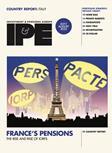Ircantec unveils oil and gas divestment and engagement plan
Scheme to dump traditional bond holdings, shares in specialised and non-European majors
You have now reached your article limit
Already a registered user or member? Sign in here
To continue reading, register free today for access
Registration also includes access to

Five reasons to register today
- Access to IPE articles from our award-winning editorial team
- Unique IPE market data, rankings and tables
- In-depth interviews with pension fund leaders
- Extensive coverage of latest asset class trends
- Comprehensive archive of data, research and intelligence







